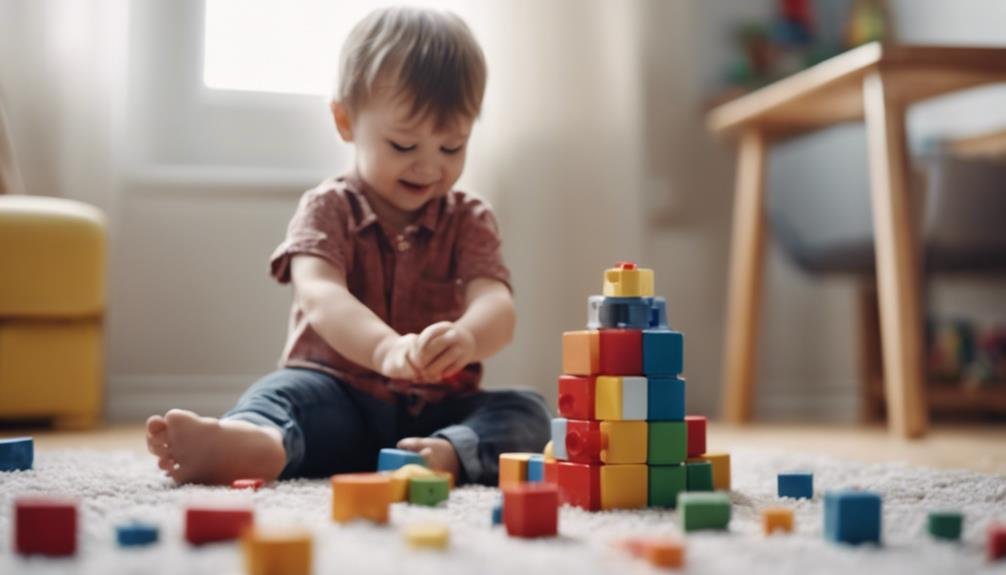"Cherishing Little Steps - A Haven for Baby and Family Journeys"
The Latest Research on Toddler Development: Parental Insights
In your journey as a parent navigating the intricate world of toddler development, you might find yourself intrigued by the potential impact of parental insights on shaping your child's growth. As you explore the latest research findings, you could uncover valuable strategies that enhance various aspects of your toddler's well-being. From cognitive milestones to emotional regulation techniques and beyond, there is a wealth of knowledge waiting to be discovered that could profoundly influence your parenting approach.
Key Takeaways
- Implement positive discipline for growth and set clear boundaries.
- Limit screen time to educational content and balance with outdoor play.
- Engage in play-based learning for cognitive and social development.
- Establish predictable routines and rules for security and stability.
- Foster holistic development through interactive activities and face-to-face interactions.
Cognitive Development Milestones

When observing your toddler's cognitive development, it's essential to recognize the key milestones they're reaching. At this stage, your child is beginning to show signs of understanding simple instructions and following routines. You may notice them starting to identify common objects and point to body parts when asked. These early cognitive skills are crucial building blocks for their future learning and comprehension abilities.
As your toddler grows, their memory will also improve, allowing them to remember familiar faces, places, and objects. Encouraging activities that involve repetition, such as reading the same books or singing familiar songs, can help strengthen their memory development. Additionally, toddlers at this stage are starting to engage in imaginative play, pretending with toys and imitating everyday actions they observe.
Emotional Regulation Techniques
To better support your toddler's emotional development, understanding and implementing effective emotional regulation techniques is key. Toddlers are experiencing a wide range of emotions as they navigate the world around them, and helping them regulate these emotions lays a crucial foundation for their future well-being. One powerful technique is modeling appropriate emotional responses yourself. By demonstrating how to express and manage emotions in a healthy way, you provide a valuable example for your toddler to learn from.
Another effective strategy is teaching simple breathing exercises. Encouraging your toddler to take deep breaths when they're upset can help them calm down and regain control of their emotions. Additionally, creating a calm environment at home can support your toddler's emotional regulation. Consistent routines, clear boundaries, and a safe space for your child to express their feelings can all contribute to a sense of security and stability.
Social Skills Development Strategies

Implementing structured social activities and fostering positive interactions can significantly enhance your toddler's social skills development. Research suggests that engaging your child in activities like playdates, group games, or toddler classes can provide valuable opportunities for them to learn how to interact with others, share, take turns, and communicate effectively.
Encouraging your toddler to engage in parallel play, where they play alongside other children, can also help them start understanding social norms and cues.
Additionally, modeling positive social behaviors yourself can have a profound impact on your toddler's development. Demonstrating kindness, empathy, and good communication skills in your interactions with others can teach your child valuable lessons through observation. Praise and reinforce positive social behaviors in your toddler to encourage them to continue developing these skills.
Language Acquisition Tips
To further nurture your toddler's development, guiding their language acquisition is pivotal in expanding their communication skills and cognitive abilities. Engage in meaningful conversations with your child, using simple words and phrases to encourage language development. Research suggests that reading to your toddler daily can significantly boost their vocabulary and comprehension skills. Choose age-appropriate books with colorful illustrations to make the reading experience interactive and enjoyable.
Additionally, labeling objects around the house can help your toddler associate words with their meanings, enhancing their language acquisition process.
Another effective tip is to repeat words and phrases frequently to reinforce learning. Encourage your child to mimic sounds and words you say, fostering their speech development. Praise their efforts and show enthusiasm during these verbal interactions to boost their confidence.
Motor Skills Enhancement Activities

Enhancing your toddler's motor skills through engaging activities is essential for their physical development and coordination. These activities not only help in building strength and agility but also improve cognitive functions. Research suggests that children who engage in regular motor skill enhancement activities tend to have better focus and problem-solving abilities. Below is a table outlining some effective activities you can incorporate into your toddler's routine to boost their motor skills:
| Activity | Description |
|---|---|
| Obstacle Course | Set up a simple course with tunnels, cones, etc. |
| Dance Parties | Play music and encourage your toddler to dance. |
| Balloon Volleyball | Bat a balloon back and forth to improve hand-eye coordination. |
| Simon Says | A classic game that enhances listening skills and coordination. |
| Scavenger Hunt | Search for items around the house or yard. |
Sleep Patterns and Behavior
Understanding your toddler's sleep patterns and behavior is crucial for promoting healthy rest and overall well-being. As a parent, being attuned to your child's sleep habits can help you provide the necessary support for their development.
Here are some key points to consider:
- Consistent Bedtime Routine: Establishing a regular bedtime routine can help signal to your toddler that it's time to wind down and prepare for sleep. Consistency in bedtime rituals, such as reading a story or singing a lullaby, can create a calming environment conducive to rest.
- Monitor Total Sleep Time: Keep track of how much sleep your toddler is getting each day. While individual sleep needs vary, toddlers generally require around 11-14 hours of sleep, including naps. Monitoring their sleep duration can give you insights into their overall well-being.
- Address Sleep Challenges Promptly: If you notice any persistent sleep difficulties, such as frequent night wakings or trouble falling asleep, it's essential to address these issues promptly. Consulting with a pediatrician or sleep specialist can help identify underlying causes and provide strategies for improvement.
Prioritizing healthy sleep habits can positively impact your toddler's cognitive function, mood regulation, and overall health.
Nutritional Guidelines for Toddlers

Ensuring your toddler receives adequate nutrition is vital for their growth and development during this crucial stage of life. Toddlers need a balanced diet rich in essential nutrients to support their rapid physical and cognitive development. Research suggests that offering a variety of foods from all food groups is key to meeting your toddler's nutritional needs.
Encourage your little one to eat fruits, vegetables, whole grains, lean proteins, and dairy products to ensure they get a diverse range of vitamins and minerals. It's important to limit sugary snacks and beverages as they provide empty calories and can lead to nutritional deficiencies.
Iron and calcium are crucial for toddlers, so include foods like fortified cereals, lean meats, beans, and dairy in their meals. Offering small, frequent meals and snacks can help meet their energy requirements and support healthy growth. Remember, every child is different, so consult with a healthcare provider for personalized nutritional guidance tailored to your toddler's needs.
Screen Time Recommendations
To support your toddler's overall development, it's important to be mindful of their screen time and adhere to recommended guidelines. Excessive screen time can impact your child's cognitive, social, and physical development. Here are three key points to consider:
- Limit Screen Time: The American Academy of Pediatrics recommends that children between 2-5 years old should have no more than one hour of high-quality screen time per day. This includes watching educational programs or engaging in interactive activities.
- Quality Over Quantity: Focus on the quality of screen time rather than the quantity. Choose age-appropriate, educational content that promotes learning and social interaction. Be actively involved in co-viewing and discussing the content with your child.
- Balance with Other Activities: Encourage a balanced routine that includes a variety of activities such as outdoor play, reading, creative play, and social interactions. Limiting screen time allows for more opportunities for physical exercise, imaginative play, and face-to-face interactions that are crucial for your toddler's holistic development.
Positive Discipline Approaches

When guiding your toddler's behavior, employing positive discipline approaches fosters a supportive and nurturing environment for their growth and understanding of boundaries. Positive discipline involves strategies that focus on teaching and guiding rather than punishing. Research suggests that toddlers respond well to positive reinforcement, such as praising good behavior or using rewards like stickers. This approach helps to build your child's self-esteem and encourages them to continue displaying positive behaviors.
Setting clear and consistent boundaries is also crucial in positive discipline. By establishing predictable routines and rules, toddlers can learn what's expected of them, promoting a sense of security and stability. Additionally, redirecting your toddler's behavior towards more appropriate actions can be an effective way to address challenging situations without resorting to punitive measures.
Play-Based Learning Benefits
Engaging in play-based learning with your toddler can significantly enhance their cognitive development and social skills, laying a strong foundation for future academic success. Through interactive play, children not only have fun but also acquire essential skills that support their overall growth and learning.
Here are three key benefits of incorporating play-based learning into your toddler's daily routine:
- Enhanced Cognitive Abilities: Play-based learning stimulates various areas of the brain, promoting problem-solving, creativity, and critical thinking skills in toddlers.
- Improved Social Skills: By engaging in play with others, toddlers learn important social cues, cooperation, and communication skills that are vital for building relationships.
- Boosted Emotional Development: Play allows children to express themselves, understand their emotions, and develop empathy towards others, fostering emotional intelligence from a young age.
Frequently Asked Questions
How Can Parents Address Sibling Rivalry Among Toddlers?
Address sibling rivalry among toddlers by acknowledging their feelings, setting clear boundaries, and encouraging positive interactions. Validate their emotions, provide individual attention, and foster teamwork through shared activities. Consistent communication and modeling healthy conflict resolution are key.
What Are Some Effective Ways to Encourage Creativity in Toddlers?
To promote creativity in toddlers, engage in open-ended play like building blocks or drawing. Encourage imagination by reading and discussing stories. Research shows these activities boost cognitive skills and foster innovation. Give them space to explore!
Are There Specific Methods to Promote Independence in Toddlers?
To promote independence in toddlers, encourage decision-making, offer choices, and allow them to do tasks on their own with supervision. Celebrate their achievements, provide a safe environment for exploration, and offer gentle guidance when needed.
How Can Parents Help Toddlers Cope With Separation Anxiety?
To help toddlers cope with separation anxiety, reassure them with a consistent routine, use transitional objects, and offer affectionate goodbyes. Encourage independence by practicing short separations and gradually increasing the time apart. Your support is vital.
What Strategies Can Be Used to Manage Toddler Tantrums Effectively?
When managing toddler tantrums, remember to stay calm. Acknowledge their feelings, set clear boundaries, and offer comfort. Use positive reinforcement and redirect their attention. Consistency is key in handling these challenging moments effectively and fostering emotional regulation.
Conclusion
You've done your research, implemented the latest techniques, and provided a nurturing environment for your toddler's development.
Yet, remember, in the end, it's the unpredictable moments, the messy playtimes, and the unexpected joys that truly shape their growth.
So keep embracing the chaos, learning from the challenges, and celebrating the small victories along the way.
Parenthood is a journey of surprises, but it's the journey that matters most.


